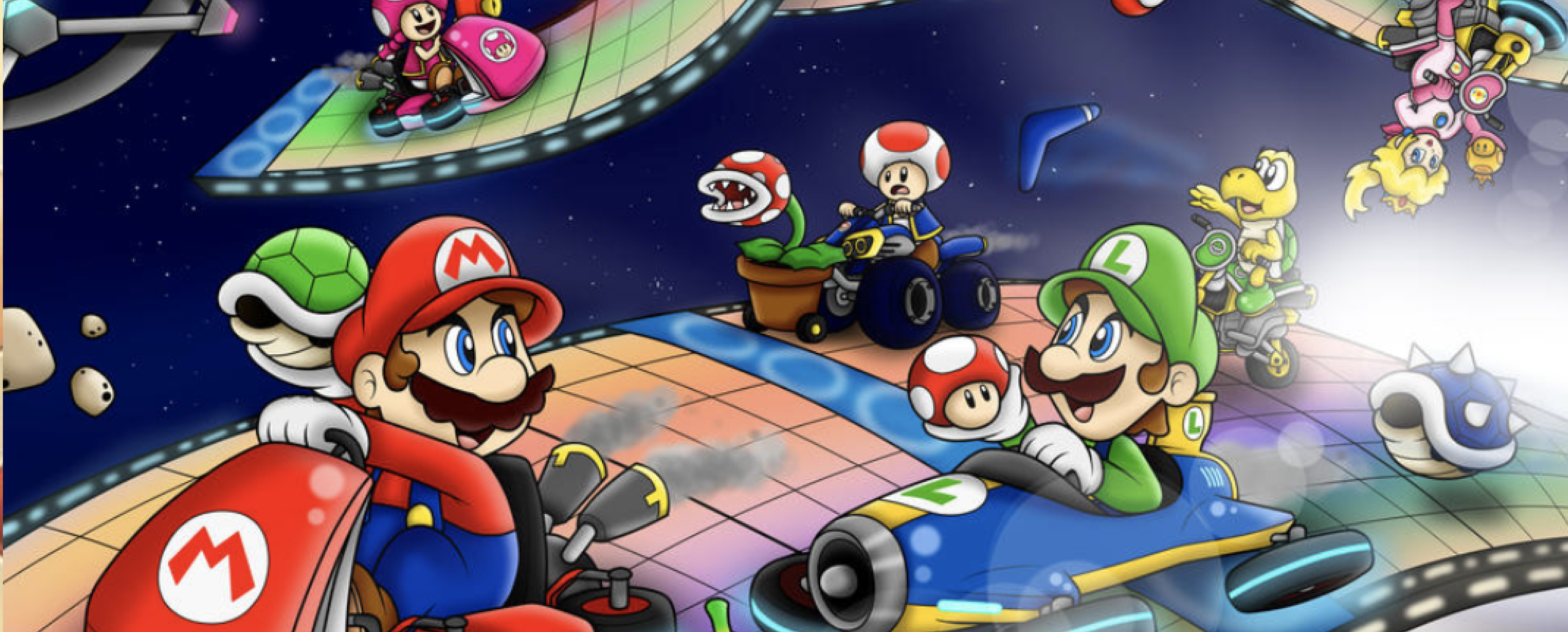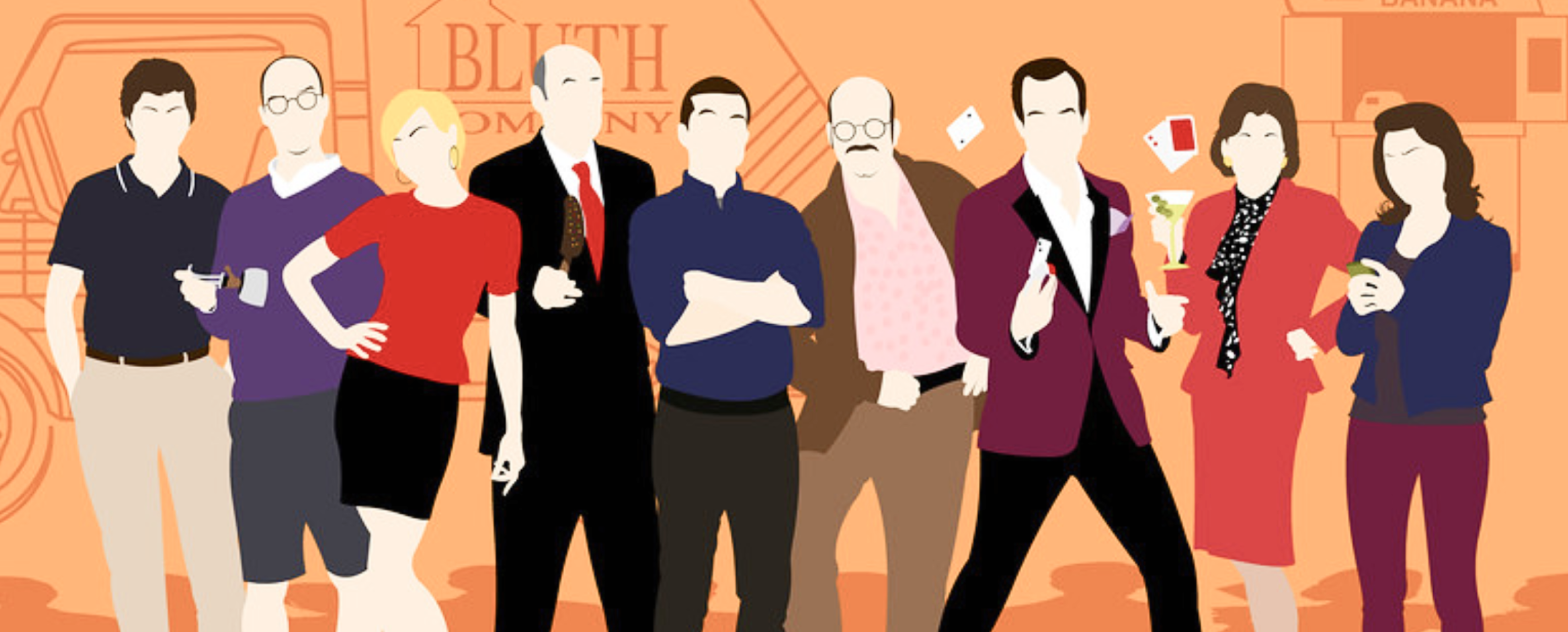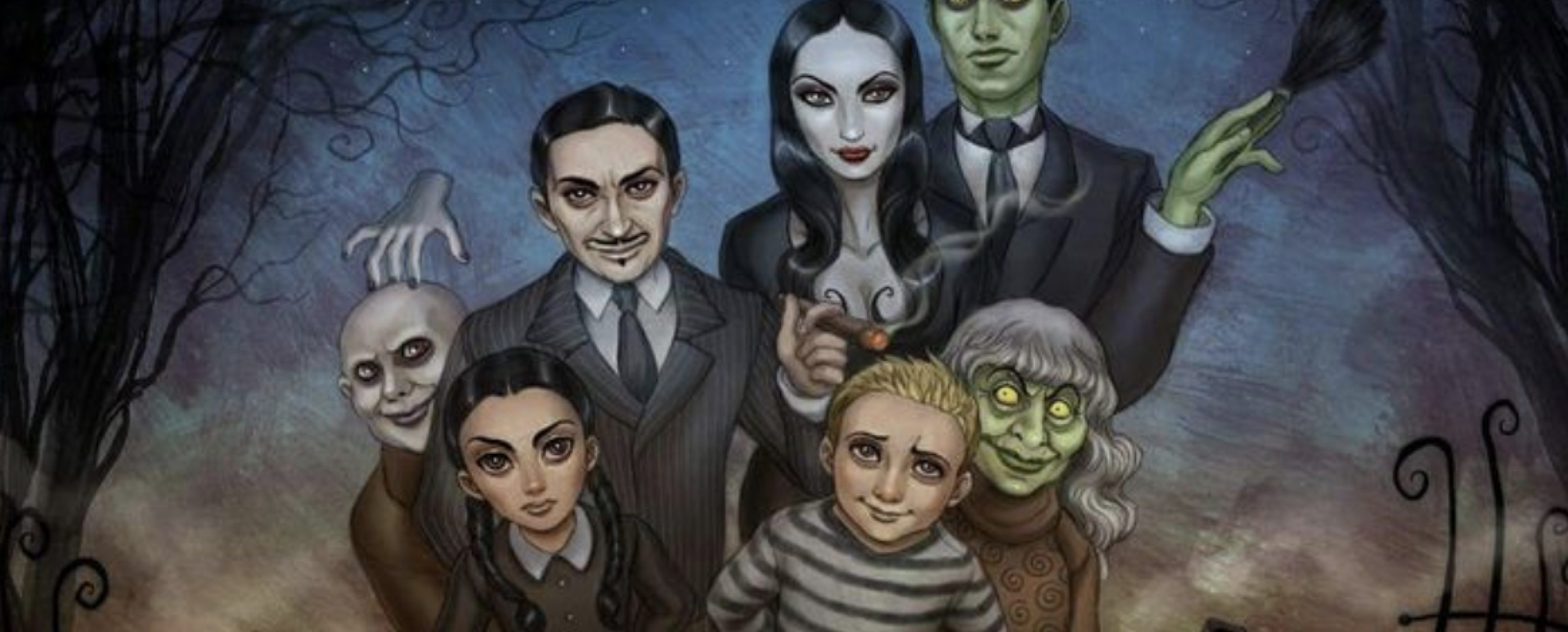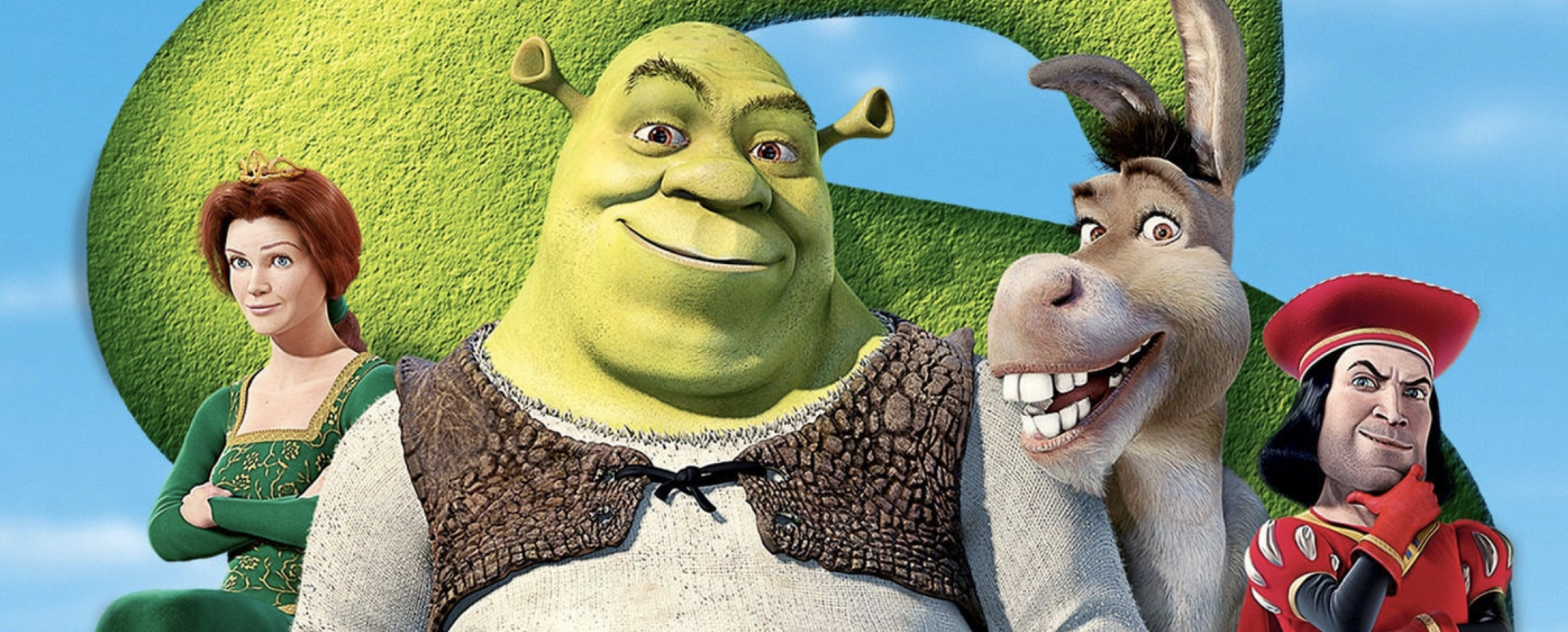
Shrek has spun out perhaps the most movie meme content for Millennials. Released in 2001, it was only the eighth full-length computer-animated film to hit theaters. It followed Toy Story’s lead by delivering a plot that appealed to kids but mixed in lots of subtle adult references. The way that it subverted traditional fairy tales—along with strong voice performances by Mike Myers, Eddie Murphy, Cameron Diaz, and John Lithgow—made it an instant classic. *Cue Smashmouth’s “All Star” *
We’re examining the main Shrek characters’ personality types using the Enneagram , highlighting and analyzing the cues we think are most important in identifying their types. The Enneagram types we’ve assigned to Shrek, Donkey, Fiona, and Lord Farquaad are our best guesses, given our observation of their motivations, decisions, behaviors, speech, body language, and more. We’ll explain which type we think they are and why, using examples when relevant.
We’re focusing on the original Shrek movie here because it’s the most well-known, although there were three sequels and another rumored to be coming out in the next few years. Spoilers for Shrek ahead (but it’s 21 years old now, so you shouldn’t be surprised by this point). Note that type descriptions below come from Blueprint, our Enneagram app .
What Enneagram type is Shrek?
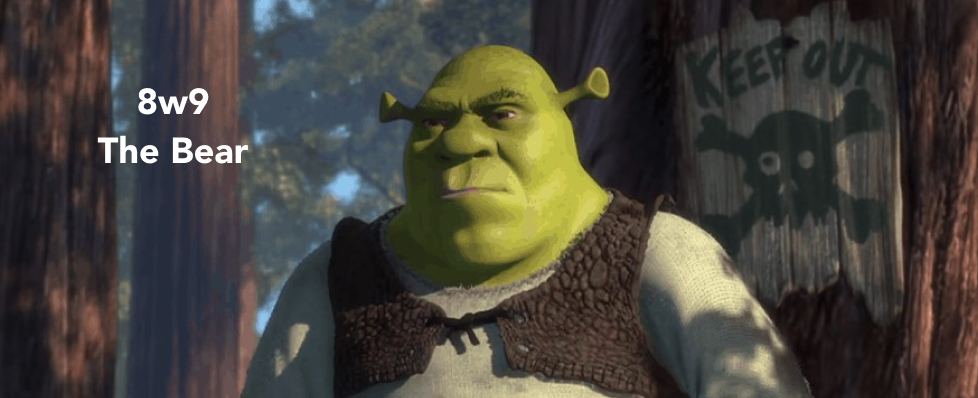
Our best guess for Shrek is an Eight with a Nine wing (the Bear): the Bear is protective, quietly strong, resolute, shrewd, watchful, territorial, objectifying, coarse, and provoking. They are attuned to others and secretly tender-hearted, but can be selfish and menacing.
We went back and forth on whether Shrek is more likely an 8w9 or a 9w8 and ultimately landed on the former. Both 8w9s and 9w8s share stubbornness, groundedness, confidence, bravery, and a lack of concern over what the average person thinks of them, but there are big differences in how they tend to act and see the world.
Need for privacy and independence
An Eight’s core fear is of being controlled by others (and their core desire is to be independent), whereas a Nine’s core fear is of loss and separation from others (and their core desire is to have peace of mind). Although Shrek shares parts of both the Eight’s and Nine’s core fears and desires, his behavior suggests that he’s more fixated on regaining his independence (getting his swamp back) and being able to live without restrictions. Eights with a dominant self-preservation instinct, which Shrek likely has, are particularly focused on protecting their home, seclusion, and way of living.
Shrek’s primary drive for most of the movie is to be left alone and regain his autonomy. The fairytale creatures’ invasion of his swamp is what sparks the rest of the plot: he seeks Lord Farquaad to get his land back, then goes on the quest to rescue Fiona in order to reclaim the deed to his property. Shrek has a “stay out of my swamp” mentality and is happy living alone in his domain, surrounded by signs proclaiming how scary and dangerous he is to trespassers:
Shrek: “I live in a swamp. I put up signs. I’m a terrifying ogre!”
Self-Preservation Eights can look like Fives because both highly value their privacy and enforce their personal boundaries. Shrek is immediately angry when the fairytale creatures move into his swamp; he doesn’t slowly build up his anger until he’s triggered like a Nine would, but instead expresses his outrage right away: “Do not get comfortable. Your welcome is officially worn out.” Shrek is just as cantankerous and resistant with Donkey: while Shrek resists Donkey’s attempts to bond, Donkey is relentless (and eventually breaks through Shrek’s defenses by the end of the movie):
[eyeing the "KEEP OUT" signs surrounding Shrek's home]
Donkey: “I guess you don't, uh... entertain much, do you?”
Shrek: “I like my privacy.”
Donkey: “Y'know, I do too. That's another thing we have in common. I hate it when you've got someone in your face, you try to give someone a hint and they won't leave, and then there's that big awkward silence, y'know?”
[big awkward silence ensues]
Donkey: “Can I stay with you?”
Shrek: “What?”
Donkey: “Can I stay with you... *please?*”
Shrek: “Of course!”
Donkey: “Really?”
Shrek: “No.”
Even after Shrek and Donkey go through a lot together in rescuing Fiona, Shrek still maintains his individualistic desire to live alone:
Shrek: “Donkey, there’s no ‘we.’ There’s no ‘our.’ And the first thing I’m going to do is build a ten foot wall around my land.”
It would be hard to argue that the strong need for connection, which is central to being a Nine, is reflected in Shrek’s character. Sure, he has some need for connection, but everyone does. For Shrek, living where he wants, how he wants, and with minimal interference seems more important.
Rudeness and rawness
Eights have a rawness to them that arises from their natural tendency to be themselves, warts and all. Especially in average to lower levels of health (which Shrek likely is, at least during the first half of the movie), Eights are who they are and don’t bother to alter their style of communication or self-presentation to make others more comfortable. Authenticity is paramount to them; if someone else gets offended, that’s their own problem. In contrast, Nines tend to avoid conflict and have more empathy. Even Nines with a strong Eight wing tend not to be as outright grumpy and confrontational as Eights.
Shrek is an extremely cranky character. He has zero patience for the homeless fairytale creatures. He continually insults Lord Farquaad (which, although it’s deserved, is still rude). He doesn’t seem to notice or really care when he offends Donkey by continually resisting their connection, saying there’s no “we” in their relationship and insulting him where it hurts most: “useless, pathetic, annoying, talking donkey!” Donkey finally calls him out on his selfishness and rudeness:
Donkey: “With you, it’s always ‘Me, me, me.’ Well, guess what? Now it’s my turn! You are mean to me; you push me around…”
Social customs and politeness often seem like arbitrary wastes of time to Eights. When Shrek rescues Fiona and she gives him her handkerchief (“I pray that you take his favor as a token of my gratitude”), he looks confused, says thanks, wipes his dirty face with it, and hands it back to her. He belches loudly after Fiona makes them eggs, making Donkey exclaim, “It’s no way to behave in front of a princess!” He keeps wanting to disavow Fiona of her romantic and unrealistic notions, even if it saddens and offends her. The very first scene of the movie shows Shrek mocking the Fiona fairy tale (“like that’s ever gonna happen!”) and tearing out a page of the book to use as toilet paper.
Part of Eights’ rawness is often reflected in their disdain for the rules, as well as a failure to even notice many of them. There’s a sharp contrast between Lord Farquaad’s obsession with the rules in DuLoc and Shrek’s ignoring them. For example, Shrek walks right up to Farquaad as the knight’s tournament is starting, interrupts the thousands of people watching, and demands that Farquaad attend to his personal gripe (getting the creatures out of his swamp). Shrek cuts right through the line to get into DuLoc, collapsing all the velvet ropes, while the employee wearing the giant Farquaad head insists on running hilariously inefficiently within the line structure. And Shrek has no hesitations about interrupting Farquaad and Fiona’s wedding at the end of the movie.
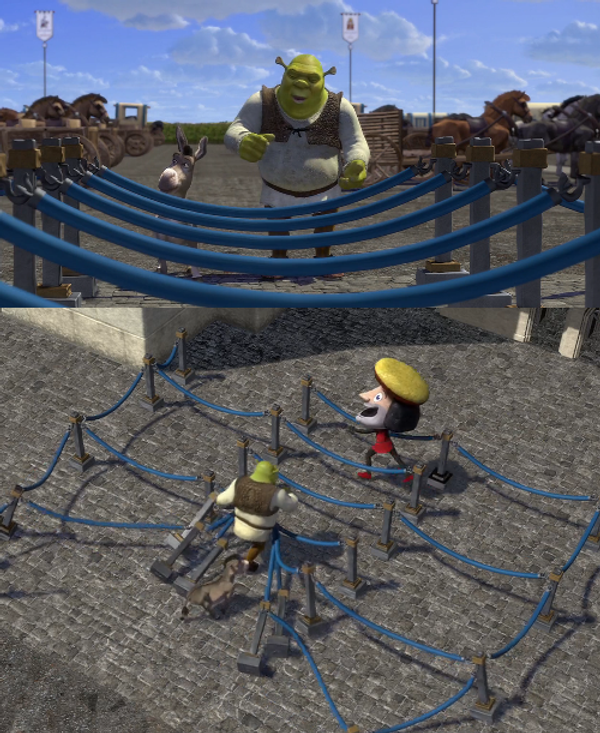
Pride in villainy
Eights often play the archetype of the “dark hero” or the “relatable villain,” someone who doesn’t fit the straightforward mold of fully good or bad. Characters like Beast from Beauty and the Beast, Maleficent from Sleeping Beauty, and Darth Vadar from Star Wars are all believed to be 8w9s. If they’re villains, they have a touch of humanity in them. And if they’re heroes, they have an obvious dark side.
Shrek fits in the role of unlikely hero: he’s cranky, he’s uncouth, and he embraces being a bit of a villain. He seems to take pride in playing the “bad guy” role with the villagers, hyping up the mythology of how dangerous he is and roaring at them to make them run away. He reasons that everyone will assume he’s the villain because of how he looks, so he embraces it and hides behind it to protect himself from being hurt:
Shrek: “Look, I'm not the one with the problem, okay? It's the world that seems to have a problem with ME! People take one look at me and go ‘Aargh! Help! Run! A big stupid ugly ogre!’ They judge me before they even know me. That's why I'm better off alone.”
Eights often employ this tactic of insulting themselves before anyone else can as a way of taking control over any areas where they’re vulnerable.
Building emotional walls
Eights want to avoid feeling violated by others. One tactic they use to achieve that is to resist showing their inner emotional and “soft” core, which they may equate with weakness. They may deny that it exists, even to themselves, as well as hide it from others until they establish a high degree of trust.
The best illustration of this principle with Shrek comes from his repeating theme about how ogres are like onions . They aren’t what they seem at first glance, and one needs to peel back the many layers of toughness to get to the vulnerable part at their center:
Shrek: “For your information, there's a lot more to ogres than people think.”
Donkey: “Example?”
Shrek: “Example... uh... ogres are like onions!”
[holds up an onion, which Donkey sniffs]
Donkey: “They stink?”
Shrek: “Yes... No!”
Donkey: “Oh, they make you cry?”
Shrek: “No!”
Donkey: “Oh, you leave 'em out in the sun, they get all brown, start sproutin' little white hairs…”
Shrek: [peels an onion] “NO! Layers. Onions have layers. Ogres have layers... You get it? We both have layers.”
[walks off]
Donkey: “Oh, you both have LAYERS. Oh. You know, not everybody like onions. CAKE! Everybody loves cake! Cakes have layers!”
Shrek: “I don't care what everyone likes! Ogres are not like cakes.”
Donkey: “You know what ELSE everybody likes? Parfaits! Have you ever met a person, you say, ‘Let's get some parfait,’ they say, ‘Hell no, I don't like no parfait.’? Parfaits are delicious!’”
Shrek: “NO! You dense, irritating, miniature beast of burden! Ogres are like onions! End of story! Bye-bye! See ya later.”
Shrek brings up the onion metaphor, then stubbornly refuses to divulge more about it when Donkey pushes. It comes to a head when Shrek starts falling for Fiona, but is afraid to express it:
Donkey: “You're so wrapped up in layers, onion boy, you're afraid of your own feelings!
Shrek: [hiding in the toilet] “Go away!”
Donkey: “See? There you are, doing it again! Just like you did to Fiona! All she ever did was like you, maybe even love you!”
Later, Donkey observes that “I think this whole wall thing is just a way to keep somebody out.” Shrek finally admits it’s true, and that he wants to keep out “everyone.” The contrast between Shrek’s outer fearlessness, strength, and power seem like they’re at odds with the sensitive person inside, but this apparent contradiction is present in all but the most healthy Eights.
Shrek’s deepest betrayal occurs when he believes that he overhears Fiona complaining to Donkey about how ugly and monstrous Shrek is. In a moment where Shrek was about to overcome his fear of vulnerability and express his love, he thinks that the woman he loves and his best friend are conspiring behind his back to insult him. The lost childhood message of the Eight is “you will not be betrayed.” Shrek reacts to his perceived betrayal by converting his sadness into more familiar anger and yelling at Donkey: “I forgive you… for stabbing me in the back!”
Demanding and action-oriented
Eights, along with Sevens, are the most action-oriented Enneagram types. They get annoyed sitting around and talking when they could be doing things. They’d rather try something and fail than miss an opportunity to act. This tendency to make things happen often results in Eights being in the center of events, even if they don’t try to be.
Whereas Nines tend to have an “I’m nobody special” vibe where they resist playing a starring role, Eights find themselves thrust in the spotlight (and sometimes enjoy it). Shrek does this when he inadvertently participates in Lord Farquaad’s knight’s tournament: he destroys the competition, playing up the wrestling moves to rile up the crowd. When he wins, he flexes his biceps, hypes up the audience, and says “I’m here til Thursday. Try the veal!”
We also see Shrek’s action-orientation in his approach to getting tasks done. He has a no-nonsense and direct way of pursuing his goals: to remove the squatters from his land, he has to get to Lord Farquaad. To get Lord Farquaad to give him the deed, he has to rescue Fiona. To rescue Fiona, he’s got to free her from a dragon. He never seems to stress or over-analyze what he has to do; he simply does it. When Fiona protests that her rescue didn’t happen in the romantic and ideal way she imagined it, Shrek simply picks her up, throws her over his shoulder, and keeps moving while she has a tantrum: “I’m nobody’s messenger boy: I’m a delivery boy.”
Another reflection of the Eight’s focus on action is that they love seeing it in other people. Eights get annoyed when people in their lives don’t stand up for themselves or continually drag their feet on what needs to be done, but they deeply respect when people come into their own strength, fight for themselves, and maintain their own boundaries. One of the first moments where it becomes clear that Shrek is falling for Fiona is when she beats up Robin Hood and all of his men during their attempt to “rescue” her. Shrek admires her combat skills and willingness to stand up for herself.
What Enneagram type is Donkey?
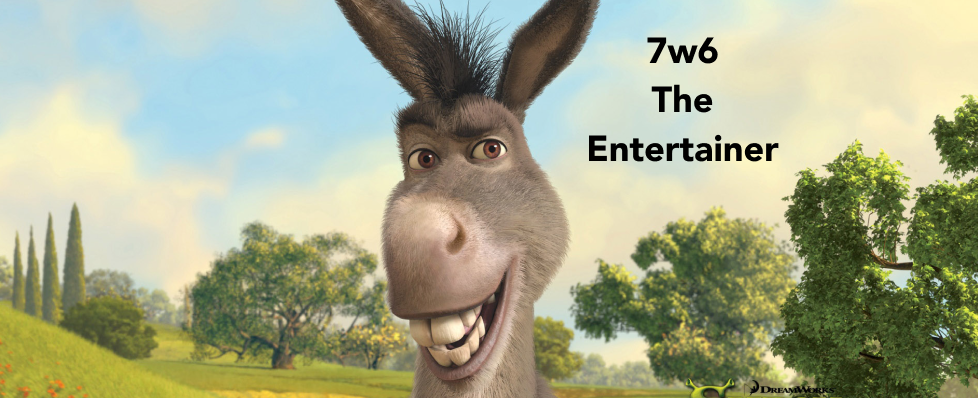
Our best guess for Donkey is a Seven with a Six wing (the Entertainer): the Entertainer is gregarious, animated, spontaneous, quick-thinking, uninhibited, restless, distractible, nervous, and manic. They are high-energy and optimistic, but can be highly avoidant and chaotic.
We wondered if Donkey could be a Two because he seems to prioritize being loved and needed, but upon rewatching the movie, it seems clear that his core desires are more about having fun, avoiding being trapped, and being entertaining, all of which fit better with the Seven. Twos and Sevens are both positive thinkers who look on the bright side, which can make them look alike.
Quick-thinking and fast-talking
Sevens are known for being storytellers and idea-generators who can think on their feet. These traits come across clearly in Donkey, who spins off stories effortlessly (and often to Shrek’s annoyance). Donkey’s big mouth is both a hindrance and a help in the movie: he runs it without seeming to think of the consequences, but it also saves him multiple times. For example, he talks his way out of the dragon killing him when he realizes that she’s female. The moment he notices this fact about her, he quickly and creatively begins flattering her with compliments. The ability to react quickly and pivot strategies in the moment is a Seven talent.
Avoiding being trapped
The Seven’s core fear is of being trapped in pain or deprivation. Consequently, they strive to live freely and to avoid pain. They often have a knee-jerk response to feeling like they’re being restricted, immediately rebelling against it.
One of the first things Donkey says to Shrek is “Man, it’s good to be free.” He also tells Shrek that “I don’t have any friends.” A lack of relationships can be a sign of a Seven who doesn’t want to be entangled by too many people. And although it’s later confirmed that Donkey is attracted to the dragon because they end up together, his first reaction when she starts showing him affection is to try to escape:
Donkey: “I believe it’s healthy to get to know someone over a long period of time. Just call me old-fashioned.”
Donkey: “I’m not ready to rush into a physical relationship. I’m not emotionally ready for a commitment of, uh, this – magnitude is really the word I’m looking for.”
Donkey ends up with the dragon after he gets over his initial panic about being trapped in a committed relationship.
Enthusiasm and energy
Sevens have an enthusiastic energy that is very noticeable to others. They can start parties and brighten up people’s moods when no other Enneagram type could. Donkey refers to this energy himself at one point: “I guess it’s just my animal magnetism.” Adventures and novelty are the name of the game for Sevens:
Donkey: “Shrek and Donkey, two stalwart friends, off on a whirlwind big-city adventure!”
Sometimes they struggle to contain their excitement, even when expressing it could hurt them. For example, Donkey tries pretending that he can’t talk in the beginning of the movie to avoid Farquaad’s men identifying him as a magical creature, but when the fairy dust accidentally falls on him and he starts to fly, he can’t help but exclaim his joy:
Captain of Guards: [as Donkey flies through the air on pixie dust] “He can talk!”
Donkey: “That's right, fool! Now I'm a flying talking donkey! You might have seen a housefly, maybe even a superfly, but I bet you ain't never seen a donkeyfly! Ha, ha!”
[pixie dust wears off]
Donkey: “Uh-oh!”
A related aspect of Sevens’ enthusiastic energy are their positive mindsets. They tend not to dwell on negatives and will move on quickly. Donkey exemplifies this trait with Shrek: even when Shrek continually insults and rejects him, Donkey lets it roll off his back and keeps his head up. It takes an entire adventure (and many grumpy statements from Shrek) before Donkey ever addresses that he’s upset in a serious way.
Sevens with a Six wing are known as the Entertainer, a name that fits with Donkey quite literally when we see him playing the role of singer at Shrek and Fiona’s wedding.
Side of anxiety
Sevens are thinking types, which means that they tend to lead with their minds and their dominant negative emotion is anxiety. And because Donkey likely has a Six wing, and Sixes are the most noticeably fear-driven Enneagram types, he’s quite in touch with his own anxiety:
Donkey: “Donkeys don’t have layers. We wear our fear right out there on our sleeves.”
For example, he rambles out loud when he and Shrek are approaching the dragon’s lair, trying to apply logic to his worries:
Donkey: “Cause there’s nothing wrong with being afraid. Fear is a sensible response to an unfamiliar situation.”
Donkey needs reassurance to cross the bridge over the lava, seeming to have a panic attack on the way. He also has an anxiety spiral when Shrek gets shot in the butt with an arrow: “You can’t do this to me. I’m too young for you to die!” Fiona and Shrek send him on a quest looking for “healing flowers” just to distract him from his irrational fear, and he faints when Fiona pulls out the arrow. Later he shows his hypochondriac tendencies, a Six-wing trait, when Shrek and Fiona try to convince him that he’s sick so that they can spend another night camping and have more time together.
What Enneagram type is Princess Fiona?
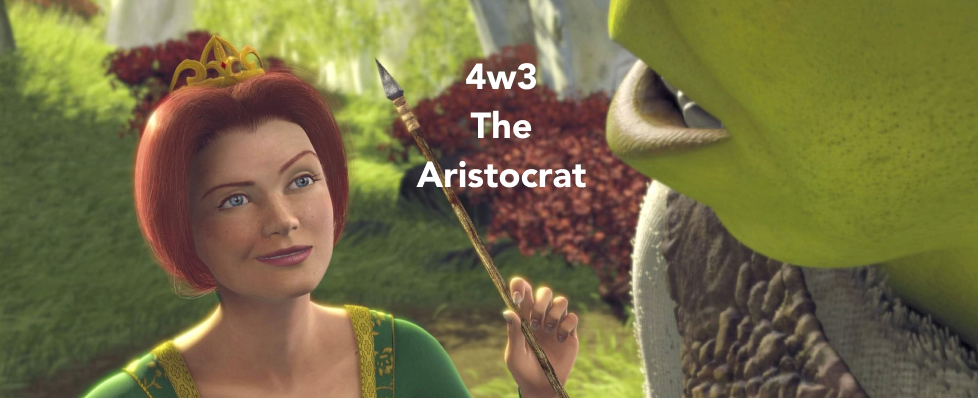
Our best guess for Fiona is a Four with a Three wing (the Aristocrat): the Aristocrat is sophisticated, distinctive, lively, expressive, sensitive, extravagant, depleted, envious, and self-punishing. They are aesthetically astute and dramatic individuals, but can be difficult and disdainful.
Fantasy and idealization
Fours tend to have an idealized version of themselves, others, and events, holding lofty and specific expectations for how things should be. They notice what is missing from their lives and the world and seek to find it. There is often a romantic side to their desires, so their conceptions of love and passion tend to be wrapped up in these expectations. Not only does Princess Fiona expect to be rescued, but she has a script that the rescuer should follow, a physical description that he should match, and a set of traits that “true love” should have. She expresses these hopes as Shrek is trying to rescue her from the castle:
Fiona: “Should it not be a wonderful, romantic moment?”
Fiona: “You should sweep me off my feet out yonder window and down a rope onto your valiant steed!”
Fiona: “You could recite an epic poem for me! A ballad? A sonnet? A limerick? Or SOMETHING!”
Fiona: “You didn’t slay the DRAGON?! But this isn’t right! You're meant to charge in, sword drawn, banners flying! That's what all the other knights did!”
While Shrek is focused on carrying out the rescue so he can get his swamp back, Fiona is stubbornly fixated on her romantic delusions of how the ideal rescue and love story should work out. She’s annoyed that her rescuer doesn’t appear to be her true love (even though it does work out that way in the end), faulting Lord Farquaad for failing to take the initiative:
Fiona: “You can tell Lord Farquaad that if he wants to rescue me properly, I’ll be waiting for him right here.”
Elitism and aesthetics
Fours, especially those with a Three wing (Aristocrats) tend to have an elitist streak. They value the upper echelon of products and people and want to align themselves with them. The opposite side of their attraction to “the good life,” however, is a judgmental streak that can rear its head when the Four’s expectations don’t match up to reality.
Fiona reacts negatively to Shrek’s looks and uncouth demeanor at first. She was expecting Prince Charming (for real):
Fiona: “A princess locked in a tower and beset by a dragon is rescued by a brave knight, and then they share true love’s first kiss.”
She treats Shrek and Donkey with respect (e.g., calling Donkey a “noble steed”) before she actually sees what they look like. But she’s quite clearly disappointed when Shrek takes off his helmet and she sees him for who he is:
Fiona: “But I have to be rescued by my one true love! Not by some ogre and his pet.”
Donkey: “Well, so much for ‘noble steed!’”
Because Fours are naturally focused on aesthetics, their elitism can show up strongly when judging images and beauty. Fiona pretends to be sleeping perfectly to cultivate the ideal image for her rescuer, even though it’s fake. She dwells on how “ugly” she thinks she is as an ogre. Even though she spends half her life in the form of an ogre, she laments that it doesn’t fit her ideal image:
Fiona: “I’m ugly, okay?”
Fiona: “I have to marry Lord Farquaad tomorrow before the sun sets and he sees me…like this.”
Fiona: “I’m a princess…and this is not how a princess is meant to look.”
Fiona: “‘Princess’ and ‘ugly’ don’t go together.”
Fiona’s curse will enable her to take love’s “true form” when she receives true love, so for her, romance is literally necessary for her to become the aesthetic version of herself that she yearns to be. The gap between Fiona’s high-minded expectations and reality is the obstacle that she needs to overcome before she can grow as a character.
Rising authenticity
Fours’ core fear is to be without identity, so they desire to find and inhabit the truest version of themselves. They become more authentic as they rise in health and personal development. Fiona exemplifies this journey: she starts off by romanticizing her own image and that of whoever will rescue her, not acting like herself but more like how she believes an “ideal princess” would. She judges Shrek’s looks and behavior harshly. But as she gets to know him, she embraces the less polished parts of herself, finds true love, and ultimately inhabits her true self, which happens to take the form of an ogre.
Both Eights and Fours are highly authentic when healthy. Donkey and Fiona’s personal attributes start to converge as Shrek begins exposing his emotions, and Fiona begins to drop the facade that she’s the perfect princess. For example, she belches alongside Shrek, prompting Donkey to comment in surprise that “She’s as nasty as you are.” When Shrek makes assumptions about how Fiona should behave, she retorts with “Maybe you shouldn’t judge people before you get to know them.” It’s a comment that resonates deeply with him.
Fiona feels betrayed when she reveals the secret of her curse to Donkey and approaches Shrek to do the same, but he rejects her. It’s based on the misunderstanding that she was talking about him when she was actually describing herself. She nearly marries Lord Farquaad after this exchange because she’s so upset that Shrek seems disgusted by who she really is. She also decides to let the clock advance to night and reveal her true form in front of the wedding guests to see how they react to her. Farquaad throws a fit, but Shrek accepts her. To a Four, someone seeing their true self—and then spurning it—is incredibly painful, whereas someone celebrating and accepting it is exceptional.
Moodiness and feistiness
Fours are known for being deeply connected to their emotions, which can manifest as moodiness. They are reactive types who expect others to rise to the level of their emotional expression and validate it. While others may feel like Fours over-express their emotions and sometimes being dramatic, Fours usually feel like they’re under-expressing them and holding back. What may seem like a fiery mood swing to others often feels like a typical emotional spectrum to Fours.
As Fiona lets down her guard and allows more of her true self to shine through, her feistiness becomes apparent. The magic mirror describes her as a “fiery redhead” who’s a “loaded pistol.” She demands that Shrek take off his helmet, yelling at him. She freaks out about needing to camp overnight so that she can hide that she’s an ogre: “I need to find somewhere to camp, NOW!” And she unleashes her anger with Robin Hood and his merry men, beating them all up and commenting “Man, that was annoying.”
Fours manipulate by being moody and temperamental: they want to feel seen for who they are and will convey their individuality by overemphasizing particular moods, highlighting strong preferences, and championing certain aesthetics or sophisticated experiences. Their speaking style is to say and do what they think without much concern for how others perceive them. They want to speak and live in the truth of their identity.
One element of Fours’ moodiness is their mysteriousness. They want to come off as intriguing and unique, so although they express themselves often, they sometimes do so in circuitous and cryptic ways. Fiona avoiding discussing her curse is an example of this mysteriousness. Sometimes Fours let the universe decide things for them, as they ascribe meaning and significance to occurrences that others may not notice. For example, Fiona frolics in the woods, picks a flower, and pulls off the petals to decide whether to tell Shrek the secret of her curse. She also manipulates Donkey into believing he’s sick and “looks awful” to buy more time to spend with Shrek, rather than state her intentions outright.
What Enneagram type is Lord Farquaad?
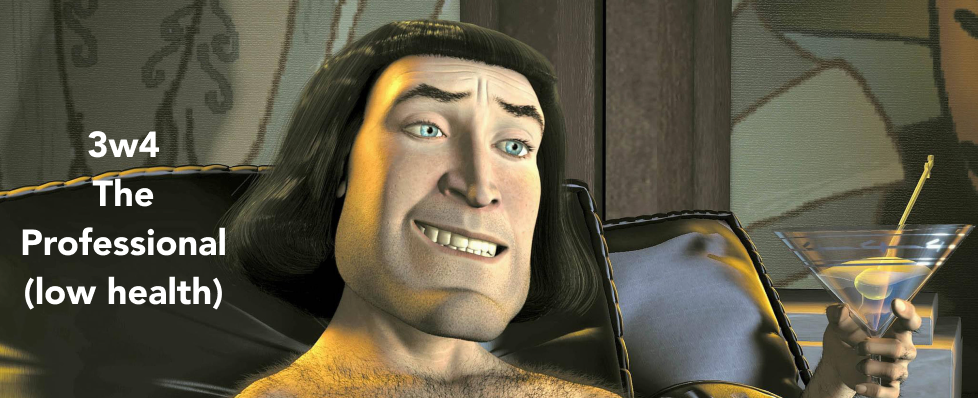
Our best guess for Lord Farquaad is a low-health Three with a Four wing (the Professional): the Professional is success-oriented, efficient, suave, diplomatic, persistent, competitive, impersonal, dismissive, and arrogant. They are industrious and high-achieving, but can be pompous and deceitful.
Lord Farquaad is either a One-ish Three or a Three-ish One, depending on how one analyzes him. In the end, we landed on Three. Although he’s certainly perfectionistic and rigid like a One, his rules seem oriented more towards cultivating an impressive image (like a Three) rather than living a moral life and being beyond criticism (like a One).
Cultivating a valuable image
Threes have a core fear of being worthless, so they work to be valued through their image and achievements. Lord Farquaad’s short stature gives him a serious Napoleon complex, a blow to his image that leads to a constant chip on his shoulder. He seems to overcompensate for his height by seeking to cultivate a “perfect” persona. For example, the version of Farquaad on his wedding cake is shown at standard height next to Fiona, which shows his embarrassment and refusal to accept himself as he is.
Lord Farquaad’s ideal image is to be the perfect king of the perfect kingdom. But to do that, he has to overcome a significant obstacle. He cannot be a king—and therefore triumph and get the validation he wants—if he doesn’t marry a princess.
Farquaad: “I will make this princess Fiona my queen, and DuLoc will finally have the perfect king!”
Thus his singular focus for much of the movie is finding this princess so that he can reach the heights that he aspires to (shortness pun intended). Of course, he puts a secondary emphasis on her image, as it will be a reflection of his own. He has trouble picking which princess to choose after the magic mirror presents the eligible bachelorettes, and seems overly concerned with the choices that his men are yelling out. Deferring to other people’s opinions and minimizing their own (or being completely out of touch with their own) is another hallmark of Threes.
Narcissism
The dark side of low health Threes’ focus on their image is narcissism. The town of DuLoc is filled with self-centered homages to Lord Farquaad: he employs people who wear gigantic helmets of his own face, the stained glass in the church has his face in it, the gift shop sells only bobbleheads of him, the bushes are trimmed into his likeness, and he sleeps with a mural of himself behind his bed. Farquaad is a caricature of narcissism.
Farquaad’s extreme narcissism is also a giveaway that he's not a One. Even when Ones go about seeking attention, they're far less direct and overtly vain about it. Ones would feel contemptible pushing themselves to the spotlight so aggressively, so they tend to rely more on their own merit or or other subtler ways to show that they did something good that others may want to recognize.
Charm and motivation
Threes are charmers who know what to say to others, and how to say it, to win them over. Threes with a Two wing are particularly good at this (and are called Charmers), whereas Threes with a Four wing (Professionals) can do it as well, but tend to invoke it on their own terms and only with people they find worthwhile. The way that Farquaad smiles and tries to make a good first impression on the magic mirror is an example of this type of charm. Of course, it’s short-lived before Farquaad resorts to threats.
A common application of Threes’ charm is in motivating others. This is a superpower of the Three, but it can be applied for more nefarious uses when Threes aren’t in good health (e.g., shirking their own responsibilities and convincing others to take care of them). Lord Farquaad chooses Fiona from the magic mirror, then immediately seeks to delegate the task of rescuing her to someone else. It’s an example of a Three persuading others and shirking work that they don’t like or think is beneath them. This is why Farquaad hosts a tournament of knights to determine the rescuer, and why he sweet-talks the competitors:
Farquaad: “That champion shall have the honor—no, no, the privilege to go forth and rescue the lovely Princess Fiona from the fiery keep of the dragon. Some of you may die, but it’s a sacrifice I am willing to make.”
Big-picture oriented
Although Ones tend to be detail-oriented, Threes are more focused on the big picture. They may get into the details, but only if they’re necessary to meet their goals. More often, they care about the end result and don’t mind cutting corners to get there more efficiently. Ones, however, tend to dot their i’s and cross their t’s even when no one is looking.
For example, Farquaad immediately stops listening to the magic mirror after he chooses Fiona. He revels in his choice and immediately moves on to thinking about the future, ignoring the mirror’s warnings about her curse. If he’d listened for only a moment, it wouldn’t have been a surprise to him at his wedding. This behavior pattern of focusing on the next achievement and tuning out the details fits more closely with a Three than a One.
Farquaad is also willing to follow Fiona’s lead and have the wedding immediately. She wants to rush it because she’s afraid of the sun setting before she’s married, which would expose her cursed form. He’s more than happy to go along because it will accelerate meeting his goal of becoming a legitimate king. Whereas Ones are more likely to be sticklers to their plans, Threes tend to be more action-oriented and willing to discard plans to move quickly.
